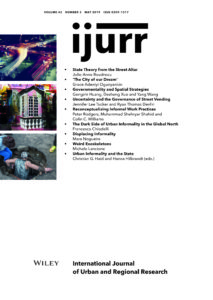This article compares two cases of displacement suffered by informal workers and informal residents in the Brazilian city of Belo Horizonte, both connected to the hosting of the 2014 FIFA World Cup. It asks the following question: considering that the right to work and the right to housing are both enshrined in the Brazilian Constitution, why do claims upon space based on those constitutional rights have different degrees of legitimacy? Two cases are analysed in detail. The first one concerns a group of informal workers displaced from their workspace for the modernization of the local stadium. The second one tells the story of an informal settlement where 90 families were displaced due to the construction of a flyover designed to improve access to the football stadium. This article engages with current postcolonial debates around urban informality, tackling two points that have been absent from these discussions. First, it compares two ways of informally occupying urban space—for work and for housing—revealing the distinct degrees of legitimacy embedded in such practices due to pre‐existing institutional arrangements. Second, it emphasizes the connection between work and home through the life strategies and place‐making practices of the urban poor.

